Kurt Gänzl
Encyclopedia of the Musical Theatre
2 January, 2024
Carl Millöcker was one of the trio of Viennese composers who were responsible for the bulk of the outstanding Operetten of the 19th-century Austrian stage.
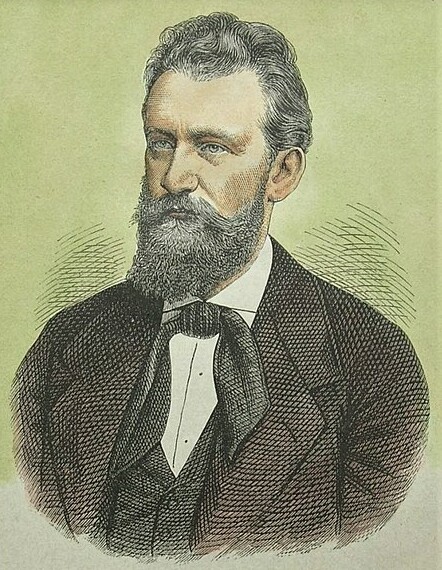
Carl Millöcker in 1883.
The son of a goldsmith, Millöcker first worked, not very wholeheartedly, for his father whilst taking his first steps towards a career in music by studying the flute with a musician from the orchestra at the Theater an der Wien. He learned piano from books, and was given lessons in composition by an elderly city official with musical connections who tutored young musicians in his free time. He later took flute lessons at the Vienna Gesellschaft der Musikfreunde, and finally began a theatre-music career at the age of 16, playing in the woodwind section of the orchestra at the Theater in der Josefstadt.
During his time as an orchestral player, Millöcker wrote his first compositions, winning encouragement so it is said from no less an authority than Franz von Suppé, and over half a dozen years he turned out a regular stream of songs, orchestral music and theatre pieces.
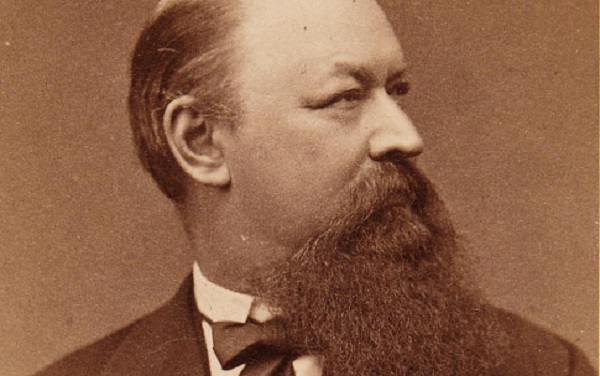
Franz von Suppé, 1870. (Photo: Fritz Luckhardt / Theatermuseum Wien)
In 1864 Suppé was instrumental in getting him appointed as a conductor at the Thalia-Theater in Graz, and it was there that the young man’s first stage works, the one-act burlesques Der tote Gast and Die lustigen Binder, were staged the following year. Towards the end of 1866 he left Graz, taking with him the theatre’s leading lady, Fräulein Kling, who had become his wife, to go back to Vienna and employment at the Theater an der Wien, under the management of Friedrich Strampfer. This engagement, however, proved unproductive of the sort of opportunities for which he was looking as a composer and even as a conductor, and he moved on to a conducting job at the less up-market but more amenable Harmonietheater, a short-lived but enthusiastic establishment set up by the Countess von Pasqualati.
There Millöcker succeeded in getting a production for his first regular Operette, Diana, a medium-sized piece written to a mythological-satirical text by Josef Braun, the librettist of Suppé’s Flotte Bursche. Diana was produced in January 1867, after its rather too daring libretto had at first led to its being postponed whilst it was sent back to the author for softening up. It was played for 13 successive nights, but then put away until a revised version was produced nearly a century later at Nuremberg (Städtische Bühnen, 21 March 1959).
Millöcker also supplied the music for several Possen and Singspiele – the local versions of musical comedies in the true sense of the words – for the Harmonietheater, and he worked with the to-be-famous playwright Ludwig Anzengruber, at that stage an actor and house writer at the theatre, on several pieces. In 1868 he moved again, this time to Budapest, to take up a post as conductor at the Deutsches Theater, and it was there that he heard his first full-length score, a resetting of the Cogniard brothers’ famous spectacular Le Royaume des femmes produced as Die Fraueninsel, performed. He returned to Vienna again the following year to take up a position as number-two conductor back at the Theater an der Wien and to place another full-length piece, Der Regiments-Tambour, at his youthful stamping-ground, the Theater in der Josefstadt.
During the 14 years which he subsequently spent at the Theater an der Wien, where he was ultimately promoted to first conductor, Millöcker turned out original music and songs for a wide variety of pieces – revues, plays, many Singspiele and Possen, and pieces described as ‘ländliche Gemälde’ (local pictures) or ‘Lebensbilder’ (life pictures), but all variants of the comedy with songs and music genre, and mainly from the highly successful pens of Alois Berla, O F Berg and Karl Costa.
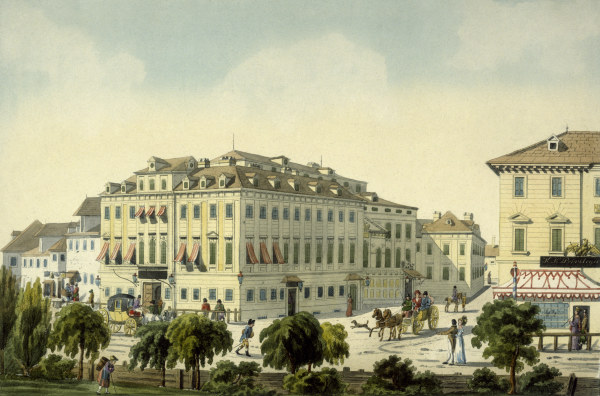
The historic Theater an der Wien.
Amongst the musical plays, the 1871 musical comedy Drei Paar Schuhe was a major success, being subsequently revived many, many times and giving Millöcker a pair of genuine hits with ‘I und meine Bua’ and ‘Bei Tag bin ich hektisch’. Further successes, in Vienna and beyond, came with Berla’s Abenteuer in Wien (1873), the revusical Erinnerung an bessere Zeiten (1874), which introduced Alexander Girardi to the the Theater an der Wien, Berg’s Possen Der barmherzige Bruder (1874) and Der närrische Schuster (1877) and Costa’s Ein Blitzmädel (1875) and Ihr Korporal (1878).
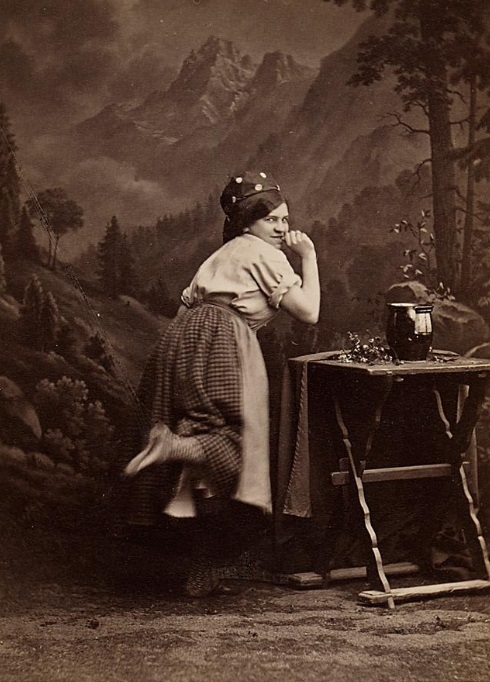
Josefine Gallmeyer in Millöcker’s “Das verwunschene Schloss”, 1878. (Photo: Atelier Rudolf Krziwanek / Theatermuseum Wien)
In 1878, encouraged by the success of Strauss’s Die Fledermaus, Millöcker ventured his nearest approach to date to a legitimate, full-sized Operette with the score for Berla’s comical piece Das verwunschene Schloss. With Girardi and Gallmeyer in its starring rôles, Das verwunschene Schloss and its songs (‘’S is a Bisserl Liab’ und a Bisserl Treu’, ‘Dalkata Bua!’, ‘O, du himmelblauer See!’) were first-rate and international successes and, although he produced further winners in the following years in the Posse genre, notably the 1880 Die Näherin, Millöcker devoted himself, from here on, principally to writing musically substantial Operetten.
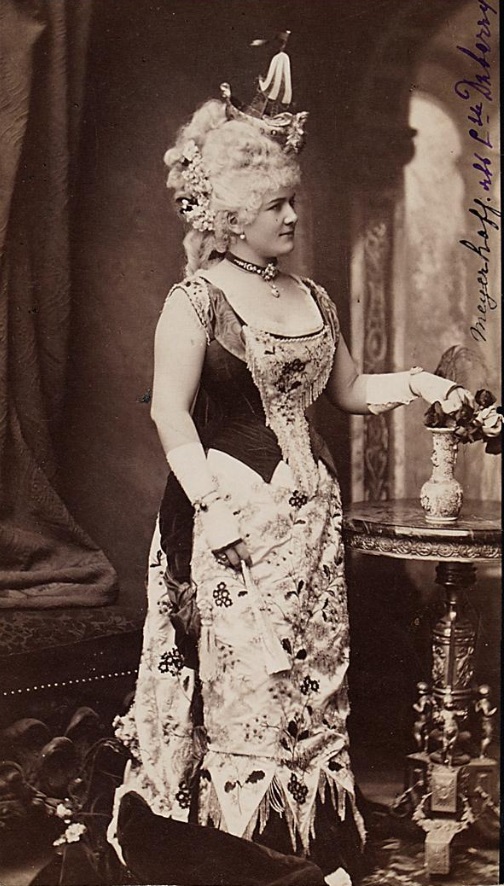
Hermine Meyerhoff as Dubarry in the 1879 production at Theater an der Wien. (Photo: Atelier Rudolf Krziwanek / Theatermuseum Wien)
Gräfin Dubarry (1879) was only a moderate success (27 performances), but Apajune, der Wassermann (1880), seen 45 times at the Theater an der Wien before moving on, gave him another internationally played success, and Die Jungfrau von Belleville (1881) confirmed that success before in 1882, after nearly 20 years of composing for the theatre, Millöcker won his greatest triumph of all with the production of Der Bettelstudent.
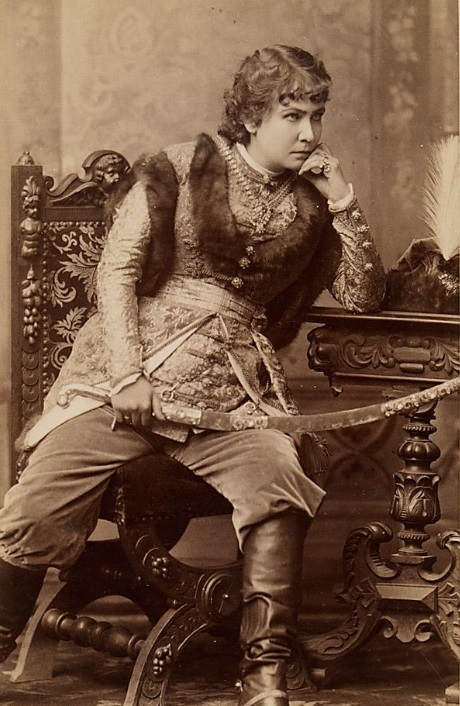
Marie Geistinger in Millöcker’s “Der Bettelstudent”, 1880s. (Photo: M. Müller Jun. / Theatermuseum Wien)
Der Bettelstudent not only proved the Theater an der Wien’s most important hit since Die Fledermaus, but it also launched one of Viennese Operette’s all-time greatest song hits, the loping baritone waltz ‘Ach, ich hab’ sie ja nur auf die Schulter geküsst’, before moving on to enormous international success.
From Der Bettelstudent on, Millöcker’s works almost all won productions around the world: the swashbuckling Gasparone, which has remained in the repertoire in Austria and Germany for the century since its production, Der Feldprediger, for a while highly popular (The Black Hussar) in America, Der Viceadmiral which suffered a little in the shadow of the production of Strauss’s Der Zigeunerbaron and was played only 30 times first up, Die sieben Schwaben and, his most successful piece after Der Bettelstudent, the comical Der arme Jonathan.
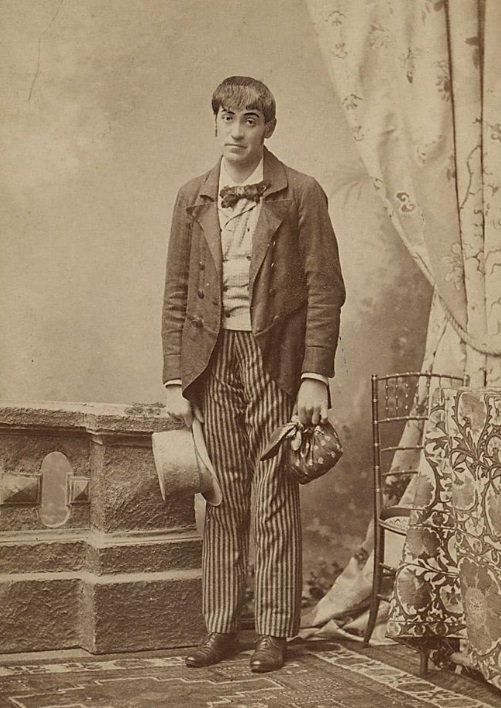
Alexander Girardi as Jonathan Tripp in Millöcker’s “Der arme Jonathan” at Theater an der Wien. (Photo: Rudolf Krziwanek / Theatermuseum Wien)
Der arme Jonathan provided a particularly happy rôle for the theatre’s adored star, Alexander Girardi, but in spite of worldwide success in the 1890s it has not survived in the repertoire with the strength of the more physically picturesque and endlessly revamped Gasparone.
Das Sonntagskind (1892) was another success and Der Probekuss (1894) played 55 times in its first run, but, in the year of its production, Millöcker suffered a stroke. Although he produced one more Operette thereafter, the indifferently received Nordlicht (1896), a part of which was later reused to make up the score of a piece called Der Damenschneider which topped a hundred straight nights in Berlin after the composer’s death, the long and brilliant career which had placed him alongside Suppé and Johann Strauss as one of the three pillars of the 19th-century Viennese school of Operette was at an end.
Two of a number of pasticcio Operetten made from his music, Jung Heidelberg(arr Ernst Reiterer/Leopold Krenn, Carl Lindau, Raimundtheater 9 July 1904, Neues Konigliches Opernhaus, Berlin 1905) and Cousin Bobby (arr L Sanger/Benno Jacobson, Franz Wagner, Theater des Westens, Berlin 29 December 1906) both found some success and productions in several countries.
Millöcker, as played by Paul Hörbiger, was the ‘hero’ of the film Operettenklänge (1945) and also appeared as a character in the film Operette where, although subsidiary to theatre manager Franz Jauner in the text, he was played by Curd Jürgens.
1865 Der tote Gast (J L Harisch) 1 act Thalia-Theater, Graz 21 December
1865 Die lustigen Binder (Gustav Stolze) 1 act Thalia-Theater, Graz 21 December
1866 Kleine Kinder (Poly Henrion) 1 act Harmonietheater 20 October
1866 Sachsen in Österreich (Henrion) 1 act Harmonietheater 24 October
1866 Wenn man Leben ins Haus bringt 1 act Harmonietheater 3 November
1866 Die Lehrbuben (Josef Doppler) 1 act Harmonietheater 3 December
1866 Stübenmädel-Geschichten, or Der junge Herr auf Nädeln (Carl F Stix) 1 act Harmonietheater 8 December
1867 (Die keusche) Diana (Josef Braun) Harmonietheater 2 January
1867 Die Neujahrstag (Karl Elmar) 1 act Harmonietheater 5 January
1867 Die Diamantengrotte (Karl Riedl) Harmonietheater 7 January
1867 Der Millionen-Bräutigam (Doppler) Harmonietheater 19 January
1867 Der Reformatürk (Ludwig Anzengruber) Harmonietheater 26 January
1867 Brave Stadtleute (Henrion) Harmonietheater 6 February
1867 Das Mädel aus Blitzblau (Henrion) Harmonietheater 6 February
1867 Die Eselshaut (Eugen Sporck) Harmonietheater 10 February
1867 Der Telegraphist in der Nacht (Anzengruber) Harmonietheater
1867 Der Sackpfeifer (Anzengruber) 1 act Harmonietheater
1868 Die Fraueninsel (Asszonyok szigete) (Théodore Cogniard, Hippolyte Cogniard ad) Deutsches Theater, Budapest
1869 Der Regiments-Tambour Theater in der Josefstadt 23 October
1869 Schottenfeld und Ringstrasse (Alois Berla) Theater an der Wien 3 December
1870 Bartelmanns Leiden (Hugo Müller) Theater an der Wien 25 April
1870 Wallach Menelaus (Berla) Theater an der Wien 7 June
1870 Die Kinder von Ungefahr (Berla) Theater an der Wien 7 September
1870 Grand Hotel (Leopold Feldmann) Theater an der Wien 7 December
1871 Drei Paar Schuhe (Karl Görlitz ad Berla) Theater an der Wien 5 January
1871 Die beiden Elfen (Julius Feld) Theater an der Wien 19 March
1871 In Paris (Berla) Theater an der Wien 6 June
1871 Gewonnen Herzen (Müller ad Josef Böhm) Theater an der Wien 14 August
1871 Der letzte Nationalgardist (O F Berg) Theater an der Wien 23 September
1871 Wähler und Quäler (Berla) Theater an der Wien 21 October
1871 Die Veilchendame (Eduard Dorn) Theater an der Wien 26 December
1872 Kläffer (C Gärtner) Theater an der Wien 25 March
1872 Ein nagender Wurm (aka Wechselbrief und Briefwechsel) (Jules Moinaux ad Josef Weyl) Theater an der Wien 15 July
1872 Das Haus Wiener und Sohn (aka Der Millionenschwindel) (Dorn) Theater an der Wien 20 August
1873 Abenteuer in Wien (aka Herr Bendels Abenteuer) (Berla) Theater an der Wien 20 January
1873 Theatralische Weltausstellungsträume (Berla) Theater an der Wien 9 August
1873 Die Tochter des Wucherers (Anzengruber) Theater an der Wien 17 October
1873 Gift (J E Mand) Theater an der Wien 7 November
1874 Die Prinzipien des Herrn Bezirksberger (Julius Johann Krassnigg) Theater an der Wien 1 February
1874 Durchgegangene Weiber (Berla) Theater an der Wien 14 February
1874 Erinnerung an bessere Zeiten (Berg) Theater an der Wien 12 June
1874 Die aufgeweckten Götter (Berg) 1 act Theater an der Wien 12 July
1874 Die Carlisten in Spanien (Berla) Theater an der Wien 14 August
1874 Der barmherzige Bruder (Berg) Theater an der Wien 20 October
1874 Die Frau von Brestl (Berg) Theater an der Wien 25 December
1875 Der Musik des Teufels (Berla) Theater an der Wien 17 April
1875 Dr Haslinger (Berg) Theater an der Wien 1 November
1876 Die schlimmen(de) Töchter (Berg) Theater an der Wien 12 February
1876 Der Confusionsrath (Julius Rosen) Theater an der Wien 8 March
1876 Der elegante Toni (aka Hass und Liebe) (Alois Blank) 1 act Theater an der Wien 1 April
1876 Die Reise durch Wien in 80 Stunden (Hermann Salingré) Theater an der Wien 26 May
1877 Ein Blitzmädel (Karl Costa) Theater an der Wien 4 February
1877 Der Löwe des Tages (Heinrich Wilken) Theater an der Wien 1 April
1877 Die Reise nach Sibirien (Karl Bruno) Theater an der Wien 21 April
1877 Hasemanns Tochter (Adolphe L’Arronge) Carltheater 6 October
1877 Ein Kassastück (Costa) Theater an der Wien 21 October
1877 Der närrische Schuster (Berg) Theater an der Wien 31 October
1878 Die Landpomeranze (Alois Just) Theater an der Wien 12 January
1878 Ihr Korporal (Costa) Theater an der Wien 19 January
1878 Das verwunschene Schloss (Berla) Theater an der Wien 30 March
1878 Die bezähmte Bisgurn (Anton Langer) Theater an der Wien 10 April
1878 Der Untaugliche (Berg) Theater an der Wien 30 October
1878 Die Trutzige (Anzengruber) Theater an der Wien 8 November
1878 Plausch net Pepi (Berla) Theater an der Wien 23 November
1879 Himmelschlüssel (Costa) Theater an der Wien 15 March
1879 Der Theaterteufel (Berla) Theater an der Wien 29 March
1879 Die umkehrte Freit (Anzengruber) 1 act Theater an der Wien 4 April
1879 Gräfin Dubarry (F Zell, Richard Genée) Theater an der Wien 31 October
1879 Aus’m g’wohnten Gleis (Anzengruber) Theater an der Wien 25 December
1880 Die Näherin (Ludwig Held) Theater an der Wien 13 March
1880 Vaterfreuden (Theodore Taube) Theater an der Wien 12 November
1880 Apajune, der Wassermann (Zell, Genée) Theater an der Wien 18 December
1881 Herz-Ass (Karl A Gorner) Theater an der Wien 29 January
1881 Ihre Familie (Berla) Theater an der Wien 12 February
1881 Die Jungfrau von Belleville (Zell, Genée) Theater an der Wien 29 October
1882 Der Mann im Monde (Costa, Eduard Jacobson) Theater an der Wien 16 February
1882 Ein süsses Kind (Franz von Schönthan) Theater an der Wien 1 April
1882 Der Bettelstudent (Zell, Genée) Theater an der Wien 6 December
1884 Gasparone (Zell, Genée) Theater an der Wien 26 January
1884 Der Feldprediger (Hugo Wittmann, Alois Wohlmuth) Theater an der Wien 31 October
1886 Der Dieb (Berla) 1 act Vaudeville Theater April
1886 Der Viceadmiral (Zell, Genée) Theater an der Wien 9 October
1887 Die sieben Schwaben (Wittmann, Julius Bauer) Theater an der Wien 29 October
1890 Der arme Jonathan (Wittmann, Bauer) Theater an der Wien 4 January
1892 Das Sonntagskind (Wittmann, Bauer) Theater an der Wien 16 January
1894 Der Probekuss (Wittmann, Bauer) Theater an der Wien 22 December
1896 Nordlicht (aka Der rote Graf) (Wittmann) Theater an der Wien 22 December
1898 Der Maler Veri (Bruno Hartl-Mitius) Theater an der Wien 5 February
1901 Der Damenschneider (Wittmann, Louis Hermann) Friedrich-Wilhelmstädtisches Theater; Carltheater 14 September
